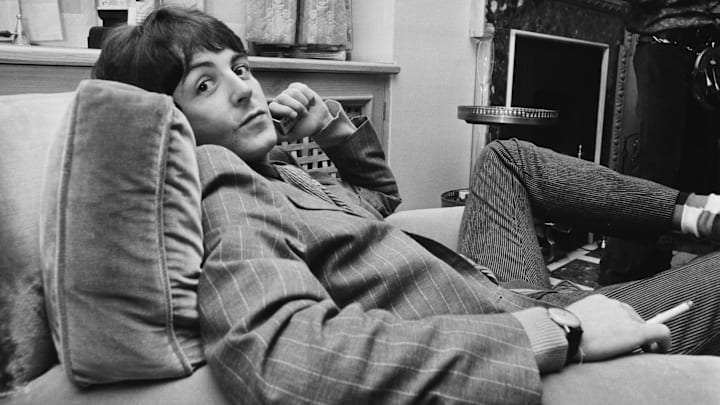Beyoncé is one of the most intentional artists on the planet. When she chooses to cover a certain song or reinterpret an entire genre of music, you can bet there’s a good reason. This is certainly true of her decision to remake The Beatles’ 1968 classic “Blackbird” for her new album Cowboy Carter, a collection of songs inspired by the chilly reception she received from some country music fans when she performed with The Chicks (then known as the Dixie Chicks) at the CMAs in 2016.
Although it’s not strictly a country album—it’s stylistically pretty varied—Cowboy Carter affirms the rightful place of Black artists in the genre. Guests include Linda Martell, the first Black artist to perform at the Grand Ole Opry. Given this inclusionary message, it’s fitting that Bey opted to cover “Blackbird” (renamed “Blackbiird” in keeping with the stylized spelling she uses on the album), a hopeful acoustic earworm that Paul McCartney wrote more than a half-century earlier with similar themes in mind.
Take These Broken Wings
When “Blackbird” arrived in 1968 on The Beatles’ self-titled 1968 double LP, known as “The White Album,” many fans probably didn’t realize that McCartney had written a low-key civil rights anthem. That’s due to the subtlety and universality of his lyrics.

“I had in mind a Black woman, rather than a bird,” McCartney told Barry Miles for the 1997 book Many Years From Now. “Those were the days of the civil rights movement, which all of us cared passionately about, so this was really a song from me to a Black woman, experiencing these problems in the States: ‘Let me encourage you to keep trying, to keep your faith, there is hope.’ As is often the case with my things, a veiling took place so, rather than say ‘Black woman living in Little Rock’ and be very specific, she became a bird, became symbolic, so you could apply it to your particular problem.”
McCartney mentions Little Rock in that quote because the song was specifically inspired by the “Little Rock Nine,” a group of Black students selected by the NAACP to attend Central High School in Little Rock, Arkansas, in September 1957, three years after the U.S. Supreme Court ruled that racial segregation in public school was unconstitutional. Arkansas governor Orval Faubus opposed desegregation and ordered the Arkansas National Guard to prevent the students from entering the school. Later that month, President Eisenhower dispatched federal troops to escort the students to class.
In 2016, McCartney met two of the Little Rock Nine—Elizabeth Eckford and Thelma Mothershed—and during a concert in the Arkansas capital, he spoke about how their experiences moved him to write the famous song.
“This is, to me, where civil rights started,” McCartney said. “We would see what was going on and sympathize with the people going through those struggles, and it made me want to write a song that if it ever got back to the people going through those struggles, it might just help them a little.”
Taking Flight
Whether people realized its true meaning, “Blackbird” grew to become one of the most covered songs of all time. (In 2008, it ranked No. 8 on a list compiled by the U.K.’s Independent newspaper.) McCartney based the music on Bach’s “Bouree in E Minor,” and the sweet melody can be adapted to fit almost any genre.
According to WhoSampled.com, “Blackbird” has been covered at least 278 times by artists ranging from folk-pop singer-songwriter Sarah McLachlan to funk-soul master and Beatles associate Billy Preston to ska/reggae legend Desmond Dekker to jam-band kings Phish.
For her cover, Beyoncé enlisted four Black female country singers—Brittney Spencer, Tiera Kennedy, Reyna Roberts, and Tanner Adell—to help sing the final verse. Beyoncé also sampled the original Beatles backing track—that’s McCartney’s guitar and foot tapping you hear on her version—and in an Instagram post, McCartney said he was “so happy” with the new rendition.
“I think she does a magnificent version of it and it reinforces the civil rights message that inspired me to write the song in the first place,” he wrote. “I think Beyoncé has done a fab version and would urge anyone who has not heard it yet to check it out. You are going to love it.
“I spoke to her on FaceTime and she thanked me for writing it and letting her do it,” McCartney continued. “I told her the pleasure was all mine and I thought she had done a killer version of the song. When I saw the footage on the television in the early 1960s of the Black girls being turned away from school, I found it shocking and I can’t believe that still in these days there are places where this kind of thing is happening right now. Anything my song and Beyoncé’s fabulous version can do to ease racial tension would be a great thing and makes me very proud.”
Beyoncé’s version also struck a chord with at least one member of the Little Rock Nine. One week after Cowboy Carter dropped, The Washington Post reported that Melba Pattillo Beals, one of the brave students who made history in 1957, was especially moved by the new recording.
“This song awakens so much,” Beals told the paper. “Paul McCartney said by writing that song, ‘I hear you. I may not be able to rescue you, but I hear you singing in your dark.’”
Read More About The Beatles:
